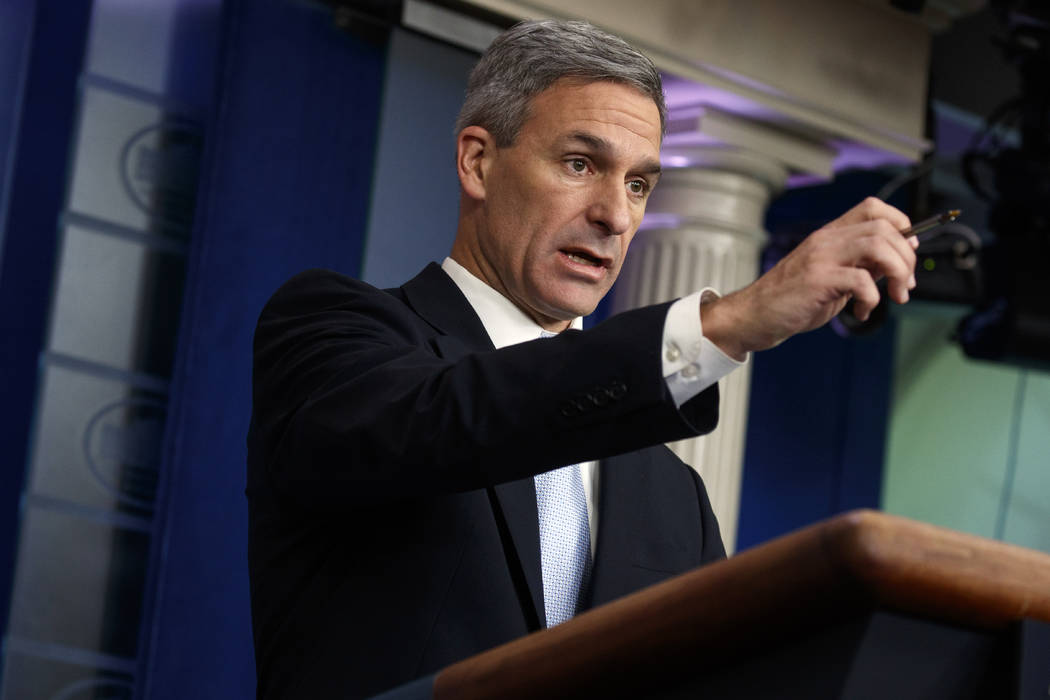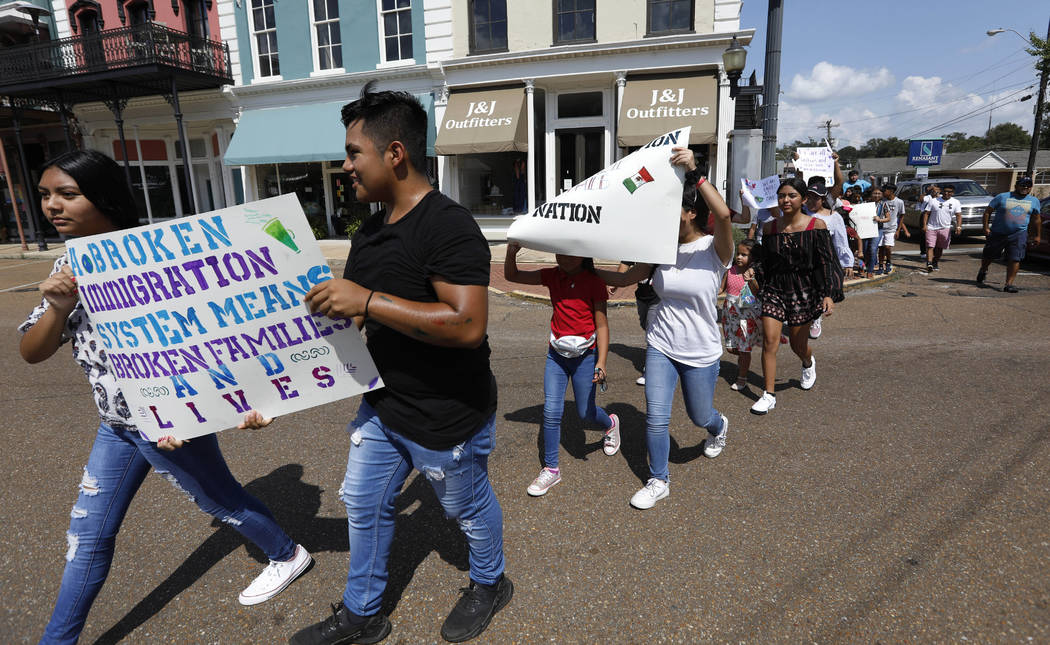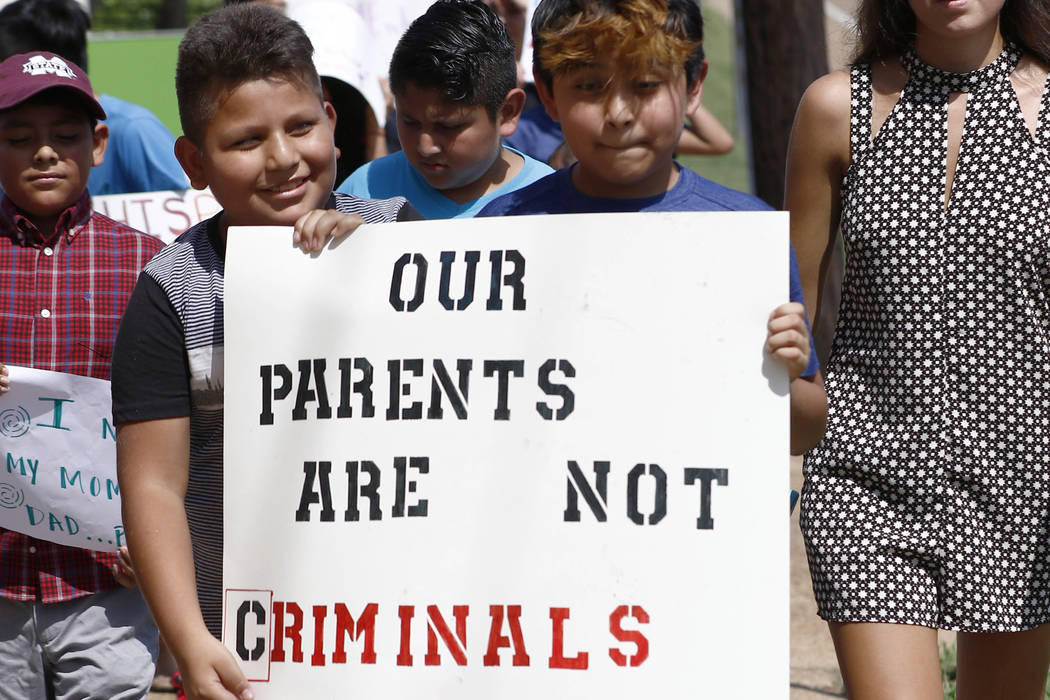New rules aim to dissuade undocumented from seeking welfare benefits
WASHINGTON — President Donald Trump’s administration is promulgating a new rule that would allow the government to take into consideration whether legal immigrants have received welfare assistance in recent years when deciding whether to grant green cards.
Acting Director of U.S. Citizenship and Immigration Services Ken Cuccinelli told reporters Monday morning that the idea is to reserve legal immigration for individuals “who can stand on their own two feet, who will not be reliant on the welfare system.”
The so-called public charge rule, which would become effective Oct. 15, also could allow officials to deny admission and visa extensions to noncitizens deemed likely to become dependent on public benefits.
Leaders from both parties showed a willingness to use the issue in the 2020 presidential campaign.
Democratic National Committee Chairman Tom Perez released a statement that said: “On the second anniversary of the tragedy in Charlottesville, Donald Trump continues to use his power to divide us. This time, he’s targeting documented immigrants who are paying taxes and playing by the rules. This action could force immigrant families to choose between putting food on the table and getting the health care they need; it could even force them to leave the country they call home.”
Rep. Steven Horsford, D-Nev., said he would fight the change.
“This fight isn’t over. We must continue to stand up, speak out, and fight back to protect immigrant families,” he said in a statement released by his office. “This regulation forces millions of families to choose between the food, shelter and health care they need and the people they love. I will continue working to secure immigrants’ rights across the country, and to protect the future for the 40,000 immigrants and 10,000 Dreamers living in my district, who need protection from this administration most.”
‘Radical open borders’
In a statement, Trump’s re-election “war room” said, “The 2020 Democrats have planted their flags firmly on the side of illegal immigration, pushing for dangerous sanctuary city policies and radical open borders while promising free health care for illegal immigrants — all while forcing U.S. taxpayers to foot the bill.”
The new rule would not apply to immigrants who are refugees or asylum seekers, or certain members of the military. It also would not penalize undocumented immigrants if another family member received public benefits.
The 837-page rule is bound to be challenged in federal courts.
Activists on both sides of the immigration issue weighed in Monday.
“Just a week after a terrorist attack in which a white supremacist killed 22 people in El Paso and specifically targeted the Latino community, the Trump administration has launched its most radical attempt yet to harm immigrant families and further its anti-immigrant agenda,” said Philip E. Wolgin, managing director of Immigration Policy at the Center for American Progress, in a statement.
The White House maintained the rule “will protect American taxpayers, preserve our social safety net for vulnerable Americans, and uphold the rule of law.”
And Mark Krikorian, executive director of the Center for Immigration Studies, said in a statement, “There are hundreds of millions of people who want to move to the United States, and this rule ensures that we allow in only those who will be able to pay their own bills.”
The rule would not apply to applications filed before Oct. 15. For those filing on or after Oct. 15, Cuccinelli said, immigration officials would consider “current and past receipt of designated public benefits while in the United States as a negative factor when examining applications.”
Immigration ‘a net plus’
Receiving a single welfare benefit for less than a year would not be a disqualifier by itself. But receiving certain benefits — such as Supplemental Security Income, food stamps, most forms of Medicaid or certain housing assistance — over a 12-month period within three years of an application “would be a heavily negative factor,” Cuccinelli said.
At the same time, immigrants with private health insurance would gain points.
“We know that most immigrants are net plus” for the economy, said Ken Oliver, senior director of the Texas Public Policy Foundation’s group Right on Immigration. He said the rule would make sure safety-net programs “don’t become a magnet for noncitizens to use.”
“I think this is going to prove that the vast majority of applicants are economically self-sufficient,” Oliver told the Las Vegas Review-Journal.
The measure allows applicants to submit public charge bonds of $8,100 or more.
Erin Quinn, senior staff attorney at the Immigrant Legal Resource Center, said of the rule, “While many immigrant families will remain eligible for needed services and not legally impacted by this change, the chilling effect of this rule will cause many families to dis-enroll children and eligible individuals form critical health-care coverage and services.”
Asked for an example, the center said: “An immigrant married to a U.S. citizen who is eligible to apply for permanent residency must now worry about the impact of this rule. Such a family will have to weigh the benefits of participating in safety net programs that help their family stay healthy and the possible negative impact at the time the person goes to adjust status to become a permanent resident.
“The rule is confusing and does not lay out clear standards to make a decision about whether someone might become a public charge in the future, making it impossible to know what will happen if the person files to become a permanent resident. For instance, if the family does everything right and receives health insurance under the Affordable Care Act, they could be penalized under this rule, risking denial of permanent residency.”
Rule long on the books
The White House argues that the public charge rule has been on the books since the 1800s and codifies the intent of two 1996 measures signed by President Bill Clinton with the expectation that new immigrants would not exploit public benefits.
The move is in keeping with Trump’s focus on pushing U.S. immigration away from family reunification in favor of a “merit-based” focus on finding migrants with the skills that meet the needs of U.S. labor markets.
According to a 2016 study by the National Academy of Sciences, 58 percent of households headed by a noncitizen use at least one welfare program.
A June 2017 poll by Rasmussen Reports found that 62 percent of likely voters support barring new immigrants from receiving welfare benefits for at least five years.
“The heavy use of welfare by immigrant households is not the result of laziness or some other moral shortcoming; immigrants are as likely to work as native-born Americans,” said Krikorian, of the Center for Immigration Studies. “Instead, it is the inevitable result of admitting people with little education, meaning that they will have low earnings in a modern, knowledge-based economy.”
The final rule was announced during the first White House briefing since March 11. When a reporter asked Cuccinelli about the Statue of Liberty plaque that invites “your tired, your poor, your huddled masses” to the United States, Cuccinelli said that “I’m certainly not prepared to take anything down off the Statue of Liberty. We have a long history of being one of the most welcoming nations in the world.”
Contact Debra J. Saunders at dsaunders@reviewjournal.com or at 202-662-7391. Follow @DebraJSaunders on Twitter.




















